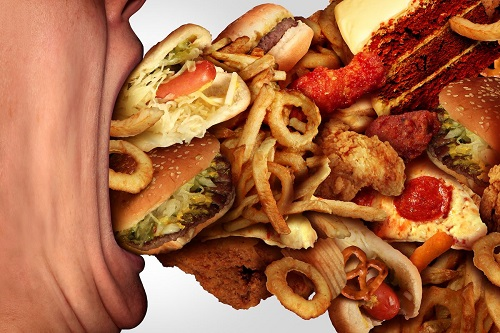Your risk of cancer depends on many different factors.
Your lifestyle choices related to nutrition are factors within your control, and research tells us you can lower your cancer risk if you:
- Achieve and maintain a healthy body weight.
- Make healthy food choices.
- Remain physically active: move more and sit less.
Take a closer look at these lifestyle choices and think about how you can put them into action.
Achieve and Maintain a Healthy Body Weight
There is strong scientific evidence linking excess body fat to increased risk of the following cancers:

- Colorectal Cancer
- Post-menopausal Breast Cancer
- Advanced Prostate Cancer
- Ovarian Cancer
- Endometrial Cancer
- Stomach Cancer
- Esophageal Cancer
- Liver Cancer
- Pancreatic Cancer
- Gallbladder Cancer
- Mouth, Pharynx or Larynx Cancer
- Kidney Cancer
Your ratio of body weight to height (BMI) and your waist circumference are two ways to assess your body fat. View BMI chart here.
Our next two lifestyle recommendations – healthy food choices and being physically active - can help you achieve and maintain a healthy body weight.
40% of all cancers diagnosed in the U.S. are linked to obesity. Learn how you can reduce your risk.
Healthy Eating Lifestyle
Your food choices are important when it comes to good health and cancer prevention.
- Whole grains, fruits, vegetables, and beans/legumes should fill about 2/3 of your plate.
- These foods provide nutrients such as dietary fiber, vitamins, minerals, and phytochemicals your body needs for good health and to prevent some cancers.
- These plant foods are generally lower in calories and can help you achieve and maintain a healthy body weight.
- Avoid “fast foods” as well as processed foods high in fat, starches and sugars. These types of foods are generally higher in calories and lower in healthy nutrients. An emphasis on these foods can lead to unplanned weight gain which may increase your risk of diabetes, heart disease, and some cancers.
Limit consumption of red meats and avoid processed meats.
- You should limit your consumption of red meats (beef, pork and lamb) to 12-18 ounces per week to lower your risk of colorectal cancer. Poultry, fish, seafood, eggs, legumes and low-fat dairy products are some examples of alternative protein choices.
- Regular consumption of processed meats (such as ham, bacon, sausage, deli meats and hot dogs) can increase your risk of stomach cancer and colorectal cancer. Processed meats should be limited to special occasions if you choose to eat them at all.
Limit consumption of sugar-sweetened drinks. Extra calories from the sweetening agents in these types of drinks can lead to unplanned weight gain and excess body fat, which can increase your risk of some cancers and other chronic diseases. Make water your go-to beverage of choice. Try flavoring your water with a tea bag or a wedge of fruit if plain water is not appealing to you.
Move More, Sit Less
- Being more physically active has many health benefits, including preserving/increasing your muscle mass and avoiding unplanned weight gain.
- Aim for 150 total minutes of moderate activity or 75 minutes of vigorous activity each week.
- Sedentary activities (such as watching television or sitting at a computer) can lead to unplanned weight gain. Take frequent breaks to walk or engage in other physical activities.
Take this physical activity quiz to see if you are physically active enough.